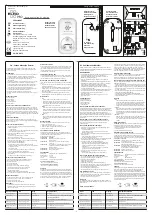
4
1. Smoke Alarm: What To Do When the Alarm Sounds
Smoke alarm pattern is three long beeps with voice “Fire!,” a 1.5 second pause, and three long beeps repeating. The red LED
blinks in time with alarm pattern.
The smoke alarm takes precedence when both smoke and carbon monoxide are present.
•
Alert small children in the home as well as anyone else that might have difficulty recognizing the importance of the
alarm sounding or that might have difficulty leaving the area without help.
•
Leave immediately by your escape plan. Every second counts, so don’t waste time getting dressed or picking up
valuables.
•
In leaving, don’t open any inside door without first feeling its surface. If hot, or if you see smoke seeping through
cracks, don’t open that door! Instead, use your alternate exit. If the inside of the door is cool, place your shoulder
against it, open it slightly and be ready to slam it shut if heat and smoke rush in.
•
If the escape route requires you to go through smoke, stay close to the floor where the air is cleaner. Crawl if neces-
sary, and breathe shallowly through a cloth, wet if possible.
•
Once outside, go to your selected meeting place and make sure everyone is there.
•
Call the fire department from your cell phone outside, or from your neighbor’s home-not from yours!
•
Don’t return to your home until the fire officials say that it is all right to do so.
•
There are situations where a smoke alarm may not be effective to protect against fire as stated in the NFPA Standard
72. For instance:
a) smoking in bed
b) leaving children home alone
c) cleaning with flammable liquids, such as gasoline
nOte:
See Section RECOGNIZING NUISANCE ALARMS, for nuisance alarm situations.





































